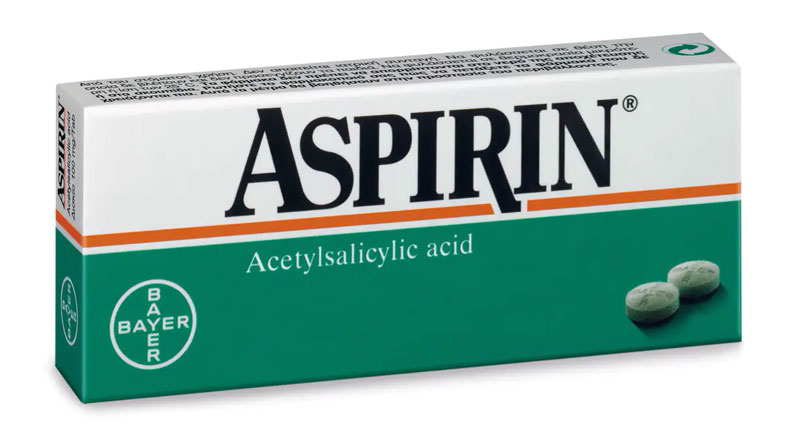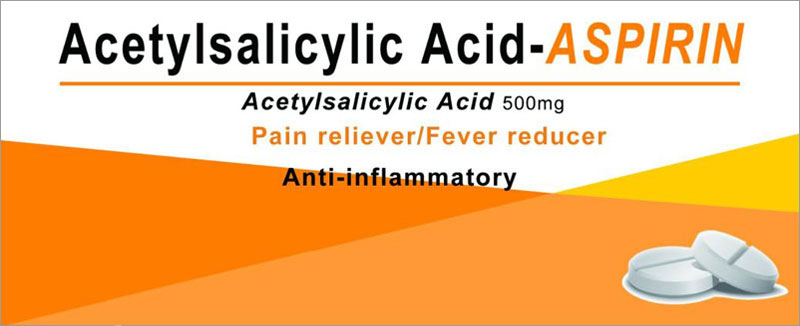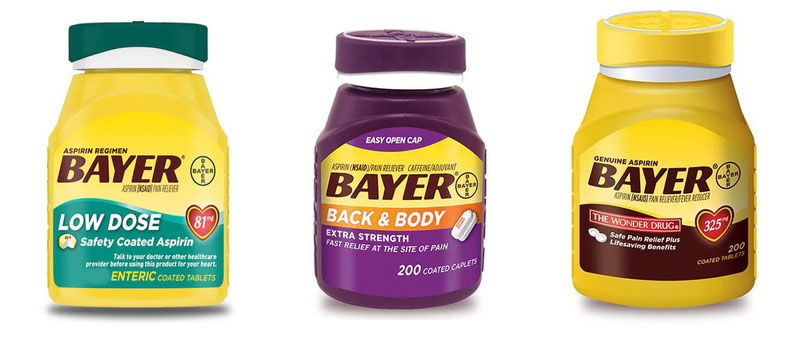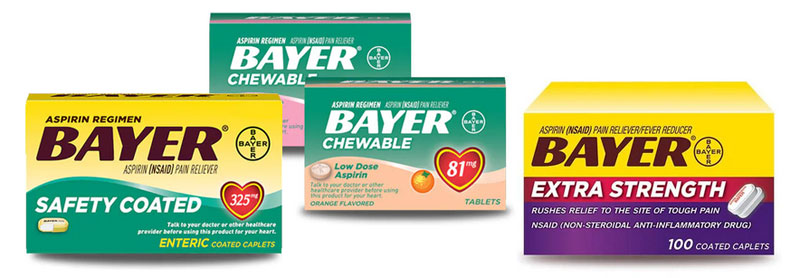

Aspirin (Acetylsalicylic Acid)
Aspirin is a daily pain reliever for pains such as headaches, toothaches, and menstrual pain. Aspirin is recommended as a safe and reliable way to relieve minor pain caused by headaches, body aches, etc. When used as prescribed. It can also be used to treat symptoms of colds and flu, as well as to reduce fever. It is also known as acetylsalicylic acid. It can also help reduce the risk of a heart attack or thrombotic (ischemic) stroke. Aspirin can even help save a person's life if taken during a suspected heart attack, so we recommend keeping aspirin readily available. Learn how aspirin works to relieve pain. Find out how how aspirin can ease your pain for minor aches, headaches, or muscle pain. It comes in the form of pills or suppositories, a medicine that you gently insert into your anus. It is also available as a gel.
For headaches, muscle pain, back pain, minor arthritis pain-almost any type of minor ache or pain people take aspirin to relieve pain. The reason is because of the way aspirin relieves pain, and it's a way to get your attention. When we feel pain, our cells produce a substance called prostaglandins. Aspirin pain relief works because aspirin suppresses the production of prostaglandins.

Aspirin, salicylates, and many over the counter pain relievers also belong to a group of drugs called Platelet aggregation inhibitors. Platelet aggregation inhibitors act at different sites in the clotting cascade and prevent platelet adhesion, so clot formation does not occur. Aspirin, the most commonly used anti-aggregant drug, changes the balance between prostacyclin (which inhibits platelet aggregation) and thromboxane (which promotes aggregation). It irreversibly inhibits the enzyme cyclooxygenase, resulting in decreased synthesis of thromboxane in platelets and prostacyclin in vascular endothelial cells. The vascular endothelium recovers and can synthesize more prostacyclin, but thromboxane synthesis is restored only after new platelets are formed. Platelet aggregation inhibitors are actively used in myocardial infarction, atrial fibrillation, after coronary bypass surgery, angioplasty and stenting. It is also used as prevention of myocardial infarction and stroke.
Aspirin Brand Names:
Zorprin, acetylsalicylic acid, Bayer Buffered Aspirin, Durlaza, Asatab, Adprin-B, Alka-Seltzer Extra Strength with Aspirin, Alka-Seltzer with Aspirin, Arthritis Pain Formula, Ascriptin, Ascriptin Maximum Strength, ASA, Bayer Children's Aspirin, Bayer Women's Low Dose, Bayer Low Adult Strength, Bayer Advanced Aspirin, Bayer Extra Strength, Bayer Extra Strength Plus, Bufferin, Bufferin Extra Strength, Ecotrin, Ecotrin Maximum Strength, Empirin, Extended Release Bayer 8-Hour Caplets, Extra Strength Bayer Plus Caplets, Genuine Bayer Aspirin, Halfprin, Maximum Bayer Aspirin, St. Joseph Adult Chewable Aspirin, St. Joseph Regular Strength.
What kind of pain Aspirin treat
Headache
When a headache begins, take a suitable pain reliever, such as aspirin. Aspirin has been proven to be effective in relieving tension headaches. Be sure to read and follow the instructions on the label. From minor headaches caused by overstretched eyes to sinus headaches caused by stuffiness - and all the other varieties in between, almost everyone has experienced a headache. In any case, remember that if you suspect you have a serious injury, the pain lasts a long time or comes back, even if it's a mild pain, you should see a doctor immediately.
Muscle Pain
Sports-related injuries cause inflammatory reactions that cause pain. But pain is not only felt by athletes. There are many familiar everyday situations that lead to muscle pain.
Poor posture. Improper sitting for hours in the office or lifting heavy objects without proper posture.
Repetitive movements. At work, in the garden, at the computer.
Muscle pains occur mostly in the neck, shoulders and back. When minor aches and pains occur, aspirin, one of the most studied non-steroidal anti-inflammatory drugs (NSAIDs) in history, is safe and effective if taken as prescribed. Be sure to read and follow the instructions on the label. In any case, remember that if you suspect you have a serious injury, muscle pain that lasts a long time or that continues again, even if it is mild pain, you should see your doctor immediately.
Back Pain
If you feel pain in your back (lower back), you are not alone. Almost everyone has back pain at some point, which can interfere with work, daily activities, or rest. The vertebrae, muscles, nerves and joints are inextricably linked throughout our backs. So when muscles or joints are weak or fatigued-especially because of an infrequently exercised spine or poor posture-the pain can occur all over the back. When minor aches and pains occur, aspirin, one of the most studied nonsteroidal anti-inflammatory painkillers in history, is a safe and effective pain reliever. If you feel severe back pain, if the pain does not go away within a few days or resumes, even if it is mild, you should see your doctor immediately.
Arthritis Pain
If you have minor arthritis pain, Aspirin can provide fast and effective pain relief. Osteoarthritis or OA (degeneration of the cartilage that connects the joints of the bones) is one of the ten most disabling diseases in developed countries. An estimated 30 million Americans suffer from OA, which can cause a lot of discomfort and interfere with daily life.
Aspirin is also indicated:
- To reduce the combined risk of death and nonfatal stroke in patients who have had ischemic stroke or transient ischemia of the brain due to fibrin platelet emboli
- To reduce the risk of vascular mortality in patients with a suspected acute myocardial infarction (MI)
- To reduce the combined risk of death and nonfatal MI in patients with a previous MI or unstable angina pectoris
- To reduce the combined risk of MI and sudden death in patients with chronic stable angina pectoris
- In patients who have undergone revascularization procedures (e.g., coronary artery bypass graft [CABG], percutaneous transluminal coronary angioplasty [PTCA] or carotid endarterectomy [CEA]) when there is a preexisting condition for which aspirin is already indicated
- For the relief of the signs and symptoms of rheumatoid arthritis, juvenile rheumatoid arthritis, osteoarthritis, spondyloarthropathies, and arthritis and pleurisy associated with systemic lupus erythematosus
Each dose of aspirin should be taken with a full glass of water, unless patient is fluid restricted. Anti-inflammatory and analgesic dosages should be individualized. When aspirin is used in high doses, the development of tinnitus may be used as a clinical sign of elevated plasma salicylate levels except in patients with high frequency hearing loss.
How can aspirin prevent a heart attack?

If you have had a heart attack or stroke, your doctor will probably recommend that you take aspirin daily unless you have a history of serious allergies or bleeding problems. If you are at high risk for a first heart attack, your doctor will probably recommend aspirin after weighing the risks and benefits. Aspirin interferes with blood clotting. When you bleed, blood clotting cells called platelets accumulate at the site of the wound. Platelets form a plug that closes a hole in a blood vessel and stops bleeding. But this clotting can also occur in the blood vessels that supply your heart with blood. If your blood vessels are already narrowed because of atherosclerosis - a buildup of fatty deposits in the arteries - the fatty deposits in the mucous membrane of the vessels can burst. Then a blood clot can quickly form and block an artery. This prevents blood flow to the heart and causes a heart attack. Aspirin therapy reduces platelet clumping, which can prevent a heart attack. While sometimes taking aspirin for most adults for headaches, body aches, or fevers, taking aspirin daily can have serious side effects, including internal bleeding.
Aspirin effectiveness
Aspirin is highly advertised, and there are many different brands from which to choose. We recommend plain generic aspirin for intermittent use, such as for an occasional headache. There are several forms of aspirin available. These are plain aspirin, enteric-coated aspirin, and buffered aspirin. Enteric-coated aspirin should not be used for occasional problems, such as headaches, because it is absorbed more slowly than regular aspirin and takes more time to relieve pain. Taking aspirin with food or after meals can decrease stomach upset. If you are on a high-dose salicylate treatment together with antacids, do not suddenly change (start or stop) the way that you take antacids without talking to your doctor first.

Dosage Forms and Strengths
Adult and Pediatric Dosage Forms and Strengths
Tablet:
- 81 mg
- 325 mg
- 500 mg
Tablet, delayed-release:
- 162mg
- 325mg
- 500mg
Tablet, chewable:
- 75 mg
- 81 mg
Tablet, enteric-coated:
- 81 mg
- 162 mg
- 325 mg
- 650 mg
Gum, chewing, oral:
- 227 mg
Extended-release capsule (Durlaza Rx) adult only:
- 162.5 mg

Aspirin should be taken with food.
- Usual doses for mild to moderate pain are 350 or 650 mg every 4 hours or 500 mg every 6 hours.
- Doses for rheumatoid arthritis include 500 mg every 4-6 hours; 650 mg every 4 hours; 1000 mg every 4-6 hours; 1950 mg twice daily.
- Heart attacks are prevented with 75, 81, 162 or 325 mg daily.
- 160 to 325 mg of non-enteric coated aspirin should be chewed immediately when experiencing symptoms of a heart attack.
- The dose for preventing another stroke is 75 to 100 mg daily.
Overdosage
Sometimes a person takes aspirin without knowing that they have been taking other medications that also contain aspirin. If they have a medical condition that affects their body's ability to process aspirin, such as liver or kidney disease, they are more likely to experience an accidental overdose. Exposure to aspirin may cause rapid breathing at first. Someone facing an overdose may also experience nausea and vomiting. This is because aspirin can irritate the stomach. If you think you or a loved one has experienced an aspirin overdose, seek medical help immediately. You can also call the poison center at 800-222-1222. They are open 24 hours a day, seven days a week. If you're not sure if you've taken enough to be considered an overdose, it's best to go to the emergency room anyway. Otherwise, you may miss precious time to start treating the poisoning.
Child overdose
Aspirin manufacturers make protective caps for children to reduce the likelihood that a child will get access to aspirin. However, they are not always effective. You can prevent this by keeping aspirin in a safe place.
Precautions
It is very important that your doctor check your progress while you are taking this medicine. This will allow your doctor to see if the medicine is working properly and decide if you should continue taking it. Aspirin should not be used to treat a heart attack. In that case, use immediate-release aspirin. Make sure your doctor knows if you are pregnant or breastfeeding. Do not take Aspirin during the later part of a pregnancy unless your doctor let you to. This medicine can increase your risk of bleeding, including stomach ulcers or bleeding. This usually happens if you take aspirin with certain medicines (eg, NSAIDs, blood thinner). See your doctor immediately if you have black, tarry stools, severe or continuing abdominal pain, unusual bleeding, bruising, weakness, or vomiting blood or material that looks like coffee grounds. Do not take other medicines unless they have been cleared with your doctor. This includes prescription or over-the-counter (OTC) medicines and herbal or vitamin supplements.
Who should not take Aspirin?
- Anyone who has an allergy to NSAIDs or salicylates
- Anyone who has an active ulcer disease
Common side effects
Aspirin side effects may include:
- rash
- gastrointestinal ulcerations
- abdominal pain
- upset stomach
- heartburn
- drowsiness
- headache
- cramping
- nausea
- gastritis
- bleeding
Get emergency medical help if you have signs of an allergic reaction to aspirin: hives; difficult breathing; swelling of your face, lips, tongue, or throat. Stop using this medicine and call your doctor at once if you have:
- ringing in your ears, confusion, hallucinations, rapid breathing, seizure (convulsions)
- severe nausea, vomiting, or stomach pain
- bloody or tarry stools, coughing up blood or vomit that looks like coffee grounds
- fever lasting longer than 3 days
- swelling, or pain lasting longer than 10 days
Risks and Benefits
One study that combines data from many other studies studied the risks and benefits of adding aspirin therapy to the drug regimen of patients who were already taking an oral anticoagulant such as warfarin, including patients with atrial fibrillation or with mechanical heart valves. This study demonstrated that there is little support in the published literature for the common clinical practice of adding aspirin to oral anticoagulant therapy except in select patients with a mechanical heart valve. The additional risk of bleeding was not thought to be warranted.
Another study examined the effects of long-term, low-dose aspirin therapy in VTE in healthy women. The study found that aspirin therapy is not effective in primary prevention of VTE in women with low-to-moderate risk of VTE.
According to a study, taking 75 to 81 milligrams of aspirin a day (one low-dose aspirin tablet) could be the safest, most effective way to prevent heart disease in patients who require aspirin therapy. The study also found that taking doses of aspirin larger than 100 milligrams a day does not have any clear benefit for preventing heart disease — and it may actually be harmful to patients' health.
Results of another major study, showed that daily aspirin use in diabetic patients who had never had cardiovascular disease led to a lower risk of serious heart disease, but this benefit was offset by an increased risk of major bleeding.
Where to buy Aspirin?

In USA, Aspirin is an over-the-counter medicine which can be purchased without a prescription from any retail outlet in USA. This includes grocery stores, convenience stores, medicine shops. It can also be purchased from online pharmacies. A generic version of Aspirin also is available. According to the Food and Drug Administration (FDA), "Generic drugs are required to have the same active ingredient, strength, dosage form, and route of administration as the brand name product." However, it is important to note that you should buy generic Aspirin only from proven online pharmacies. An online pharmacy with a good reputation will be the right choice to buy this medicine.